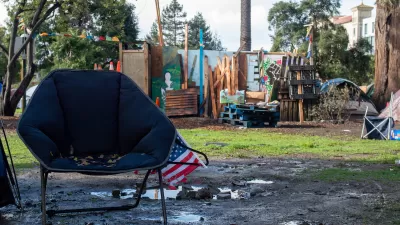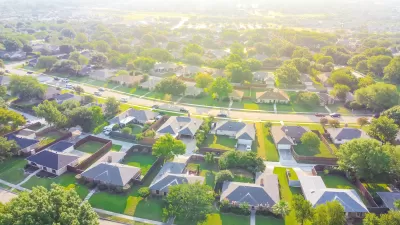Has George Lucas discovered the ultimate anti-NIMBY weapon? Hint: It's not a lightsaber

By Keli Tianga
George Lucas seems to be on a mission to be an affordable housing developer—or at least to use affordable housing to get back at his cranky neighbors.
The Star Wars creator recently filed a pre-application with the Marin County Community Development Agency, located in San Rafael, Calif., to build an affordable housing development on property he partially owns (he deeded the majority to the Marin County Open Space District over a decade ago) in Lucas Valley (not named for him). This comes on the heels of his proposal several years ago to build a new production studio on the same site, which his neighbors fought against until he withdrew it.
Lucas, backed by a group of developers and funders, then proposed an affordable housing development in 2012, but that project fizzled out. He is back, this time with the intention of funding the project himself.
So, is this the ultimate NIMBY payback, or actual altruism?
Because I am an optimistic conspiracy theorist, I like to think that Lucas never really intended to build his studio on the site at all, but used the proposal to "clear the path," as it were, to this project, the one he really wants to execute, by giving neighbors a vision of something they'd like even less up front, so affordable housing, in a county notorious for being unaffordable, feels like a compromise. Could this be the new stealth anti-NIMBY strategy?
Now, common sense tells me this is probably not true, but this is a small victory for affordable housing nonetheless, as Lucas' celebrity brings some attention to the issue. Especially in California, where all matter of housing, not just affordable, is expensive and out of reach for the average person.
Of course the affordabiltiy goals of the project are modest. According to the website of Petaluma Ecumenical Properties, the senior affordable housing developer that is partnered with Lucas on the project, the development would include 100 or so units for seniors at a variety of income levels and 120 units for people with annual incomes at 80 percent of the area’s average median income—which for Marin County would mean $65,700 to $101,400, clearly not what most of us think of as in need of affordable housing (though that may be changing and there are arguments about this). Indeed, the cover of Lucas's proposal uses the term "Work Force" housing, which we've taken issue with on Rooflines for its distinction between working people like teachers, police officers, and nurses, and "other" working people, namely, the working poor, some of whom presumably also work in Marin. In fact, in 2011, a report issued as an initiative of the Non-Profit Housing Association of Northern California found that 60 percent of people who work in Marin commute in from outside the county, traveling farther on average than any other workforce in the Bay Area. Marin's lack of affordable housing was cited as a primary cause, with two-thirds of Marin workers earning less than the $56,000 per year needed to afford to rent a one-bedroom apartment...
FULL STORY: Affordable Housing Strikes Back

Maui's Vacation Rental Debate Turns Ugly
Verbal attacks, misinformation campaigns and fistfights plague a high-stakes debate to convert thousands of vacation rentals into long-term housing.

Planetizen Federal Action Tracker
A weekly monitor of how Trump’s orders and actions are impacting planners and planning in America.

San Francisco Suspends Traffic Calming Amidst Record Deaths
Citing “a challenging fiscal landscape,” the city will cease the program on the heels of 42 traffic deaths, including 24 pedestrians.

Defunct Pittsburgh Power Plant to Become Residential Tower
A decommissioned steam heat plant will be redeveloped into almost 100 affordable housing units.

Trump Prompts Restructuring of Transportation Research Board in “Unprecedented Overreach”
The TRB has eliminated more than half of its committees including those focused on climate, equity, and cities.

Amtrak Rolls Out New Orleans to Alabama “Mardi Gras” Train
The new service will operate morning and evening departures between Mobile and New Orleans.
Urban Design for Planners 1: Software Tools
This six-course series explores essential urban design concepts using open source software and equips planners with the tools they need to participate fully in the urban design process.
Planning for Universal Design
Learn the tools for implementing Universal Design in planning regulations.
Heyer Gruel & Associates PA
JM Goldson LLC
Custer County Colorado
City of Camden Redevelopment Agency
City of Astoria
Transportation Research & Education Center (TREC) at Portland State University
Jefferson Parish Government
Camden Redevelopment Agency
City of Claremont





























